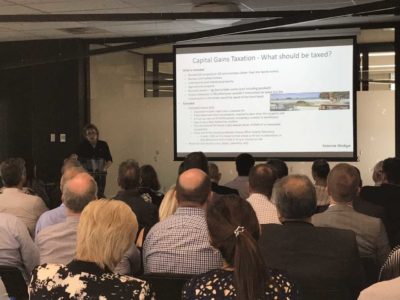
RSM New Zealand (Auckland) at Highbrook heard from Former Bell Gully tax partner Joanne Hodge on capital gains tax at a presentation on Thursday March 14.
By Eleni Balmer
Business owners face significant increases in compliance costs if proposed recommendations from the Tax Working Group are anything to go by.
The group delivered a two-volume document within 12 months. The most contentious recommendation is the introduction of a broad-based capital gains tax. Prime Minister Jacinda Ardern made a call to introduce this tax when elected.
Alarmingly, Ardern wants legislation drafted within six months, ready for the 2020 election. Using capital gains tax as a political manoeuvre and rushing through legislation is fraught with danger.
It’s no surprise then that two of the dissenting viewpoints came from tax experts within the group. Others in the group supported the broad approach and considered that the increase in compliance costs would be outweighed by reductions in investment bias.
Former Bell Gully tax partner Joanne Hodge does not hold this viewpoint. She raised concerns about the fairness of the taxation across asset classes. Presenting to an at-capacity crowd at RSM, Hodge berated the complexity and time-frame. “The New Zealand tax system is unique. Taxpayers have faith in the system and how it works, especially when compared with other countries. Ardern wants legislation ready for the next election but it’s much too complex to be rushed.”
Hodge is of the view that capital gains tax should be introduced, but over a period of time and with specific reference to different classes of assets.
There were ‘gasp’ moments when Hodge cited examples of how some of the recommendations would work. For example, an “excluded home” will be exempt from any capital gains tax. This includes the family home. However subtleties exist. Where a person has a family home, but acquires vacant land to build a new house, they must have acquired land, constructed the home and occupied it within 12 months for both properties to be excluded. If this does not occur, the original property will be captured for capital gains tax purposes.
Should a person move into residential care facility, they have 12 months in which to sell their family home before that too becomes liable for tax.
If a couple has separated, and both are living in different ‘family’ homes, those homes are only protected from tax for a period of 36 months.
With compliance costs estimated at an average of $10,000 for each of New Zealand’s 450,000 small businesses and the potential to tax gains arising after “valuation day”, businesses are already talking about reducing capital spend and adjusting valuations for tangible and intangible assets.
“Australian businesses have learned to keep their valuations below the $5 million threshold, suffocating their ability to grow in order to avoid the implications of capital gains tax. Our position should be to learn from those who have been down this road before, not to ignore it” says Lisa Murphy, tax partner at RSM.
What the tax working group has tabled is complex and has wide-ranging implications.
Murphy has a pragmatic view. ” With luck, this Government will realise the simple act of raising GST by half a per cent will generate the same amount of tax revenue in the first year, that capital gains tax recommendations would take 10 years to generate, of which 43 per cent would come from the rental housing market.”
This should be a red flag, particularly given our housing and wellbeing issues. Implications of a capital gains tax must be considered in context of both societal impact and sustainable economic growth.”
- Eleni Balmer is business manager at RSM New Zealand at Highbrook









